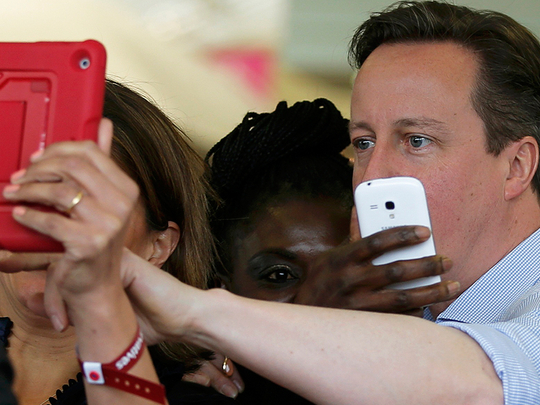
Southampton: After months of planning for tomorrow’s UK election and weeks of solid campaigning by all of Britain’s political parties, there will be no clear winner, and could very well take weeks to sort out who will actually form the next government.
The last pre-election batch of opinion polls show David Cameron’s Conservatives and Ed Miliband’s Labour tied for support nationally at 34 per cent — enough to have the largest number of seats of the 650 in the House of Commons. But not enough support nationally to get the 326 seats needed to form a majority government.
What is significant now, though, is that those same opinion polls are also showing that only 18 per cent of Britons would actually vote in favour of leaving the European Union if asked the question now in a referendum.
Cameron has set holding a referendum on the future of the UK in Europe as the key red line condition to forming a coalition government. That will appeal to the anti-EU United Kingdom Independence Party (Ukip), but is strongly opposed by the Liberal-Democrats who were junior coalition partners with Cameron in government from 2010.
With support for leaving the EU at only 18 per cent, has Cameron made a strategic mistake making that referendum the redline issue?
Cameron wants the referendum after he has had a chance to renegotiate stricter anti-immigration and other structural changes with the EU.
In Brussels, the EU chief executive, Jean-Claude Juncker, said the UK cannot impose its narrow views on the rest of the 27 other nations, and that free movement of people is a fundamental cornerstone of the political and economic union.
“I want a fair deal with Britain, but Britain is not in a situation to impose its exclusive agenda on all the other member states of Europe,” Juncker said.
Unless Cameron manages to get close enough to the 326-seat mark tomorrow, he may have no option but to talk to the Liberal-Democrats — and the referendum promise is a stumbling block.
Nick Clegg, leader of the Lib-Dems, said his party will talk to the largest party first. But the party would also look at the number of votes cast for each party as well — and not just at the number of seats won by either Conservatives or Labour.
Labour remains committed to Europe and holds that there should only be a referendum if more powers were to be transferred from nation states to the EU administration — something that’s not likely to happen anytime soon.












